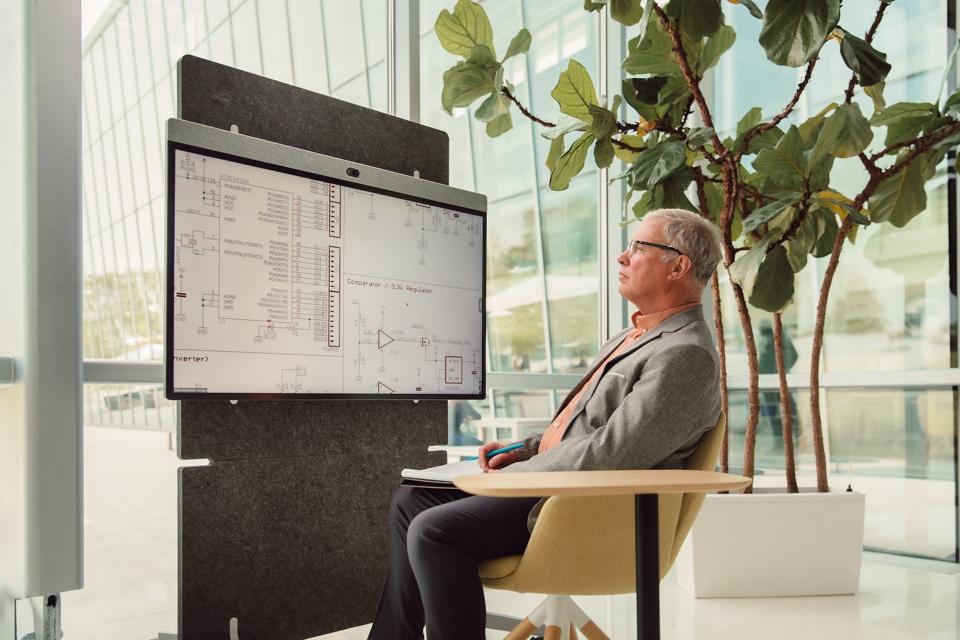Norma Lovhaugen, who serves as head of product at Oslo-based Neat, told me in an interview conducted late last month over email, the company’s modus operandi is to “create elegant video collaboration devices and unique, rich, and inclusive meeting experiences.”
For this column’s scope, the operative word in that sentence is “inclusive.” Not only does Lovhaugen and the team at Neat build high-end videoconferencing gear, the company does so with an eye towards empathy. Institutionally speaking, Lovhaugen told me prioritizing DEI is a “key part” of Neat’s corporate culture, adding that inclusivity is of crucial importance to its customers—particularly those in the enterprise.
“Our diverse backgrounds, abilities and ideas are what enable us to deliver innovative devices designed to support equitable and inclusive workplaces and educational organizations,” Lovhaugen said.
Since its founding in 2019, Neat builds software and hardware products designed for videoconferencing. Its customers include the likes of HubSpot and Rakuten. In an accessibility context, Lovhaugen explained Neat’s overarching goal is to make its videoconferencing kit accessible to and inclusive of all people of different disabilities. A primary reason for this, she said, is because the company recognizes the importance of forging a strong connection between remote and in-person workers. Such a bridge is critical for fluid collaboration, and it’s oftentimes disabled people who are the ones working from home. Lovhaugen pointed to a wealth of Neat products that are meant to make collaboration more accessible; they include Neat Boundary, which limits distractions, and Neat Board, which enables collaboration for anyone either sitting or standing. On software, Lovhaugen cited Neat’s audio processing tech helps make dialogue more intelligible and easier to hear in part by ignoring peripheral noises and amplifying voices.
This very Apple-esque vertical integration of hardware and software is what sets Neat apart from its competitors in the videoconferencing arena. An organization such as Zoom, Lovhaugen told me, “has no intention of getting into the hardware business.” Nonetheless, as a partner, Neat is able to augment Zoom capabilities with its own technologies that heighten the overall user experience for people.
“Neat continues to deliver hardware and software experiences that are accessible and adaptable enough to fluctuate with the needs of the moment, turning any space into the right space to meet,” Lovhaugen said of Neat’s mission. “Neat’s comprehensive offering of devices and software delivers engaging collaborative experiences, unleashing creativity and enabling teams to work how and where they want.”
When asked to expound on Neat’s philosophy on diversity and inclusion vis-a-vis accessibility, Lovhaugen reiterated the sentiment that inclusiveness is integral to the company’s ethos. She added the office is “fast becoming the destination for collaboration” with hybrid and remote workers joining for team-building and the like. Organizations, she said, have put in a lot of work in “[curating] a selection of collaboration, workplace management and productivity solutions with the hope that they would enable their employees to be fully engaged and effective.” As to accessibility, Lovhaugen made allusion to the fact working from afar was en vogue long before the word coronavirus become an indelible part of the everyday vernacular in 2020. To wit, many in the disability community—myself included!—have been working remotely long before COVID–19 demanded society collectively do so. Lovhaugen said in part “it’d be such a missed opportunity” to lose momentum and to lose track of the gains made during the pandemic’s apex when people were figuring out how to accessibly do their jobs—whether individually or as a group—using the modern marvels of the internet. What Neat hopes, Lovhaugen explained, is companies don’t reflexively revert back to pre-pandemic norms simply because of the comfort and familiarity inherent to precedent. The truth of the matter is, members of the disability community have been innovating and blazing trails in terms of accommodation and accessibility, redefining what work looks like out of necessity in exactly the same way the virus mandated it. The big difference is society writ large was exposed to accessibility’s challenges on a dime whereas disabled people have been forced to do so for most, if not all, of their entire lives. And this isn’t even considerate of the fact that the onset of the pandemic was a mass disabling event that, for many, induced such illness that forced them to wholly readjust to the “new normal” in terms of living (work included) and find ways to cope.
Neat’s attitudes towards their products reflect the changed landscape.
“Working together is more than just meetings and it’s time to break free and provide teams the flexibility to collaborate where and how they want,” Lovhaugen said. “We at Neat are committed to providing customers the flexibility, accessibility and simplicity they need to succeed now and in the future.”

